|
|
|
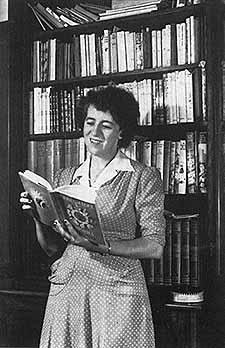
You can be this cool.

www.gutenberg.org
Free e-books :) |
|
Here are some books that I found
interesting or informative or fun. Hopefully you will enjoy them
too! They cover a wide range of topics - from physics to neurology
to science fiction and beyond.
They are presented in no
particular order, but I have divided them into fiction and
non-fiction sections to maintain some illusion of
organisation.
Also, I thoroughly recommend you check out
Project Gutenberg.
They have a digital library of public domain ebooks,
including a vast collection of HG Wells science fiction
classics.
The books are free and most are available in a
variety of formats, so work well with any e-readers (e.g.
kindle), apps for Android and Apple smartphones, tablets
or PCs. Go and explore, and I hope you find something
you enjoy! |
|
|
|
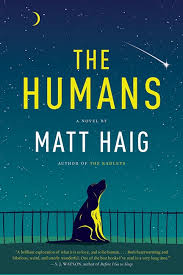 |
|
My favourite recent read - July 2015
The Humans
(Matt Haig).
Very
quirky, and a fun analysis of many aspects of the human condition
:) It
was chosen as a 2014 World Book Night title.
"A wonderfully funny, gripping and
inventive novel... ...Haig
uses the tropes of science fiction to explore and satirise
concepts of free will, love, marriage, logic, immortality and
mercy with elegance and poignancy" (The Times)
"A brilliant exploration of what
it is to love, and to be human, The Humans is both heartwarming
and hilarious, weird, and utterly wonderful. One of the best
books I've read in a very long time" (S J Watson)
"Extraordinary" (The Independent)
"Utterly wonderful" (Mark
Billingham)
"Matt Haig's hilarious novel puts
our species on the spot" (Guardian).
Read a
full review
here, and find it on Amazon
here.
|
|
|
|
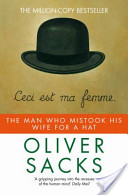 |
|
The Man Who Mistook His Wife for a Hat (Oliver Sacks).
An utterly fascinating collection of essays. Absolutely
incredible.
"The Man Who Mistook His Wife for a Hat is populated by a
cast as strange as that of the most fantastic fiction. The
subject of this strange and wonderful book is what happens
when things go wrong with parts of the brain most of us
don't know exist... Dr Sacks shows the awesome powers of our
mind and just how delicately balanced they have to be"
Sunday Times.
"Who is this book for? Who is it not for?
It is for everybody who has felt from time to time that
certain twinge of self-identity and sensed how easily, at
any moment, one might lose it" The Times.
"This is, in the best sense, a serious
book. It is, indeed, a wonderful book, by which I mean not
only that it is excellent (which it is) but also that it is
full of wonder, wonders and wondering. He brings to these
often unhappy people understanding, sympathy and respect.
Sacks is always learning from his patients, marvelling at
them, widening his own understanding and ours" Punch. |
|
|
|
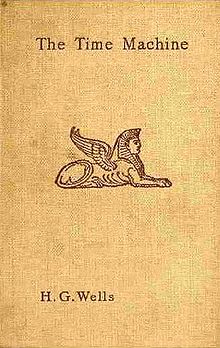
The Time Machine. |
|
The
Time machine (H.G. Wells). A brilliant classic.
Old (first published in 1895), but
a timeless classic - which is a little ironic. It's a
great read, and is available free in ebook format, from the
fantasic Project Gutenberg.
 |
|
|
|
|
|
|
|
|
|
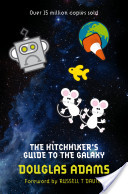
|
|
The Hitchhiker's Guide to the Galaxy (Douglas Adams)
Brilliantly funny and absurd :)
Thirty years
of celebrating the comic genius of Douglas Adams... On 12
October 1979 the most remarkable book ever to come out of
the great publishing corporations of Ursa Minor (and Earth)
was made available to humanity – The Hitchhiker’s Guide to
the Galaxy. It’s an ordinary Thursday lunchtime for Arthur
Dent until his house gets demolished. The Earth follows
shortly afterwards to make way for a new hyperspace bypass
and his best friend has just announced that he’s an alien.
At this moment, they’re hurtling through space with nothing
but their towels and an innocuous-looking book inscribed
with the big, friendly words: DON’T PANIC. The weekend has
only just begun... Volume one in the trilogy of five. |
|
|
|
 |
|
1984 (George Orwell).
Very dark
and thought provoking - a FANTASTIC read.
One of the bestselling books of the twentieth
century, 1984 is the dystopian classic that introduced such
Orwellian terms as “ Big Brother". It is 1984. The
world is in a state of perpetual war and Big Brother sees
and controls all. Winston Smith, a member of the Outer
Party and propaganda-writer at the Ministry of Truth, is
keeping a journal he should not be keeping and falling in
love with Julia, a woman he should not be seeing.
Outwardly compliant, Winston dreams of rebellion against the
oppressive Big Brother, risking everything to recover his
lost sense of individuality and control of his own future.
|
|
|
|
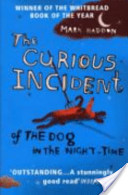 |
|
The Curious Incident of the Dog in the Night-Time (Mark
Haddon).
A
wonderful insight into the highly logical mind of a boy with
asperger's syndrome.
Narrated by a fifteen-year-old autistic
savant obsessed with Sherlock Holmes, this dazzling novel
weaves together an old-fashioned mystery, a contemporary
coming-of-age story, and a fascinating excursion into a mind
incapable of processing emotions. Christopher John Francis
Boone knows all the countries of the world and their
capitals and every prime number up to 7,057. Although gifted
with a superbly logical brain, Christopher is autistic.
Everyday interactions and admonishments have little meaning
for him. At fifteen, Christopher's carefully constructed
world falls apart when he finds his neighbour's dog
Wellington impaled on a garden fork, and he is initially
blamed for the killing.
|
|
|
|
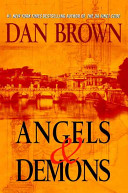 |
|
Angels & Demons
(Dan Brown).
A bit
trashy, but an exciting
storyline, with some cursory science woven through.
"World-renowned Harvard symboligist Robert
Langdon is summoned to a Swiss research facility to analyze
a cryptic symbol seared into the chest of a murdered
physicist. What he discovers is unimaginable: a deadly
vendetta against the Catholic Church by a centuries-old
underground organization - the Illuminati. Desperate to save
the Vatican from a powerful time bomb, Langdon joins forces
in Rome with the beautiful and mysterious scientist Vittoria
Vetra. Together they embark on a frantic hunt through sealed
crypts, dangerous catacombs, deserted cathedrals, and the
most secretive vault on earth . . . the long-forgotten
Illuminati lair."
|
|
|
|
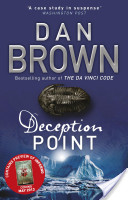 |
|
Deception Point (Dan Brown).
Trashy but fun, with a spacey-sciency theme :)
When a new NASA satellite detects evidence of
an astonishingly rare object buried deep in the Arctic ice,
the floundering space agency proclaims a much-needed
victory...a victory that has profound implications for U.S.
space policy and the impending presidential election.
With the Oval Office in the balance, the
President dispatches White House Intelligence analyst Rachel
Sexton to the Arctic to verify the authenticity of the find.
Accompanied by a team of experts, including the charismatic
academic Michael Tolland, Rachel uncovers the unthinkable -
evidence of scientific trickery - a bold deception that
threatens to plunge the world into controversy... |
|
|
|
|
|
|
|
|
|
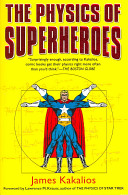 |
|
The Physics of Superheroes (James Kakalios).
A fun book using real physics to examine ideas about super
powers.
The
Physics of Superheroes applies the reality of physics to the
fantasy of comic books. James Kakalios explores the
scientific plausibility of the powers and feats of the most
famous superheroes - and discovers that in many cases the
comic writers got their science surprisingly right. Along
the way he provides an engaging and witty commentary while
introducing the lay reader to both classic and cutting-edge
concepts in physics. |
|
|
|
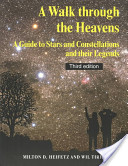 |
|
A Walk Through the Heavens (Milton D. Heifetz & Wil
Tirion).
A good book for aspiring astronomers!
A Walk through the Heavens is a beautiful and
easy-to-use guide to the constellations of the northern
hemisphere. By following the unique simplified maps, readers
will be able to easily find and identify the constellations
and the stars within them. Ancient myths and legends of the
sky are retold, adding to the mystery of the stars. Written
for the complete beginner, this practical guide introduces
the patterns of the starry skies in a memorable way. No
equipment is needed, apart from normal sight and clear skies |
|
|
|
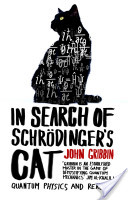 |
|
In Search of Schrodinger's Cat (John Gribbin)
A good introduction to quantum ideas.
Quantum theory is so shocking that Einstein could not bring
himself to accept it. It is so important that it provides
the fundamental underpinning of all modern sciences. Without
it, we'd have no computers, no science of molecular biology,
no understanding of DNA, no genetic engineering. In
Search of Schrodinger's Cat tells the complete story of
quantum mechanics, a truth stranger than any fiction. John
Gribbin takes us step by step into an even more bizarre and
fascinating place, requiring only that we approach it with
an open mind. He introduces the scientists who developed
quantum theory. He investigates the atom, radiation, time
travel, the birth of the universe, super conductors and life
itself. And in a world full of its own delights, mysteries
and surprises, he searches for Schrodinger's Cat - a search
for quantum reality - as he brings every reader to a clear
understanding of the most important area of scientific study
today - quantum physics. |
|
|
|
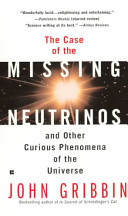 |
|
The Case of the Missing Neutrinos: And Other Curious
Phenomena of the Universe (John Gribbin).
A great read, and very accessible. A glimpse into
the weird, wonderful (and sometimes mysterious) world of
particle physics and solar physics.
Bestselling
science writer John Gribbin explores - and explains - black holes, supernovas, the big bang, and the mysterious
case of the missing neutrinos, in this "wonderfully
lucid...primer to the dizzying intermarriage of cosmology,
astronomy, and particle physics". (Publishers Weekly) |
|
|
|
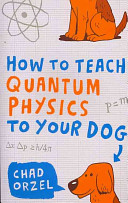 |
|
How to Teach Quantum Physics to Your Dog (Chad Orzel).
A great read. Difficult ideas put into the context
of simple, often squirrel-orientated, analogies.
When Quantum Physics expert Dr Chad Orzel
went to adopt a dog he never imagined he would end up with
one as inquisitive as Emmy. Could she use quantum tunnelling
to get through the neighbour's fence and chase bunnies? What
about quantum teleportation to catch squirrels before they
climb out of reach? In this witty and informative book,
Orzel and Emmy 'the talking dog' discuss the key theories of
Quantum Physics and its fascinating history. From quarks and
gluons to Heisenberg's uncertainty principle, this is the
perfect introduction to the fundamental laws which govern
the universe. How to Teach Quantum Physics to Your Dog
covers a lot of the ideas we study in AS chapters 6 and 7,
and puts most of the concepts as analogies involving dogs
chasing squirrels.
|
|
|
|
 |
|
Chaos (James Gleick).
The fascinating story of a very intriguing and beautiful
branch of mathematics. A great read.
The twentieth-anniversary
edition of the million-copy-plus Bestseller. This
edition of James Gleick's groundbreaking bestseller
introduces to a whole new readership the story of one of the
most significant waves of scientific knowledge in our time.
By focusing on the key figures whose genius converged to
chart an innovative direction for science, Gleick makes the
story of chaos theory not only fascinating but also
accessible, and opens our eyes to a surprising new view of
the universe.
|
|
|
|
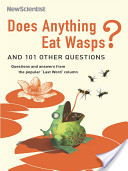 |
|
Does Anything Eat Wasps? (New Scientist)
The first of the
brilliant series of books by New Scientist. Every
year, readers send in thousands of questions to New
Scientist, the world's best-selling science weekly, in the
hope that the answers to them will be given in the 'Last
Word' column - regularly voted the most popular section of
the magazine. Does Anything Eat Wasps? is a collection of
the best that have appeared, including: Why can't we eat
green potatoes? Why do airliners suddenly plummet? Does a
compass work in space? Why do all the local dogs howl at
emergency sirens?
|
|
|
|
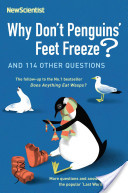 |
|
Why don't Penguins' Feet Freeze? (New Scientist).
The second of the
brilliant series of books by New Scientist. Why Don't
Penguins' Feet Freeze? is the latest compilation of readers'
answers to the questions in the 'Last Word' column of New
Scientist, the world's best-selling science weekly.
Following the phenomenal success of Does Anything Eat Wasps?
- the Christmas 2005 surprise bestseller - this new
collection includes recent answers never before published in
book form, and also old favourites from the column's early
days. Yet again, many seemingly simple questions turn out to
have complex answers. |
|
|
|
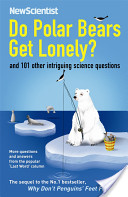 |
|
Do Polar Bears Get Lonely? (New Scientist).
Do Polar Bears Get
Lonely? is the third compilation of readers’ answers to the
questions in the ‘Last Word’ column of New Scientist, the
world’s best-selling science weekly. Following the
phenomenal success of Does Anything Eat Wasps? (2005) and
the even more spectacularly successful Why Don’t Penguins’
Feet Freeze? (2006), this latest collection includes a
bumper crop of wise and wonderful answers never before seen
in book form. As usual, the simplest questions often have the
most complex answers.
|
|
|
|
 |
|
How To Make a Tornado (New Scientist).
Science tells us grand things
about the universe: how fast light travels, and why stones
fall to earth. But scientific endeavour goes far beyond
these obvious foundations. There are some fields we don't
often hear about because they are so specialised, or turn
out to be dead ends. Yet researchers have given
hallucinogenic drugs to blind people (seriously), tried to
weigh the soul as it departs the body and planned to blast a
new Panama Canal with atomic weapons. Real scientific
breakthroughs sometimes come out of the most surprising and
unpromising work.
|
|
|
|
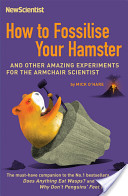 |
|
How to Fossilise Your Hamster (New Scientist).
How can you measure the
speed of light with chocolate and a microwave? Why do yo-yos
yo-yo? Why does urine smell so peculiar after eating
asparagus (includes helpful recipe)? How long does it take
to digest different types of food? What is going on when you
drop mentos in to cola? 100 wonderful, intriguing and
entertaining scientific experiments which show scientific
principles first hand - this is science at its most popular.
|
|
|
|

